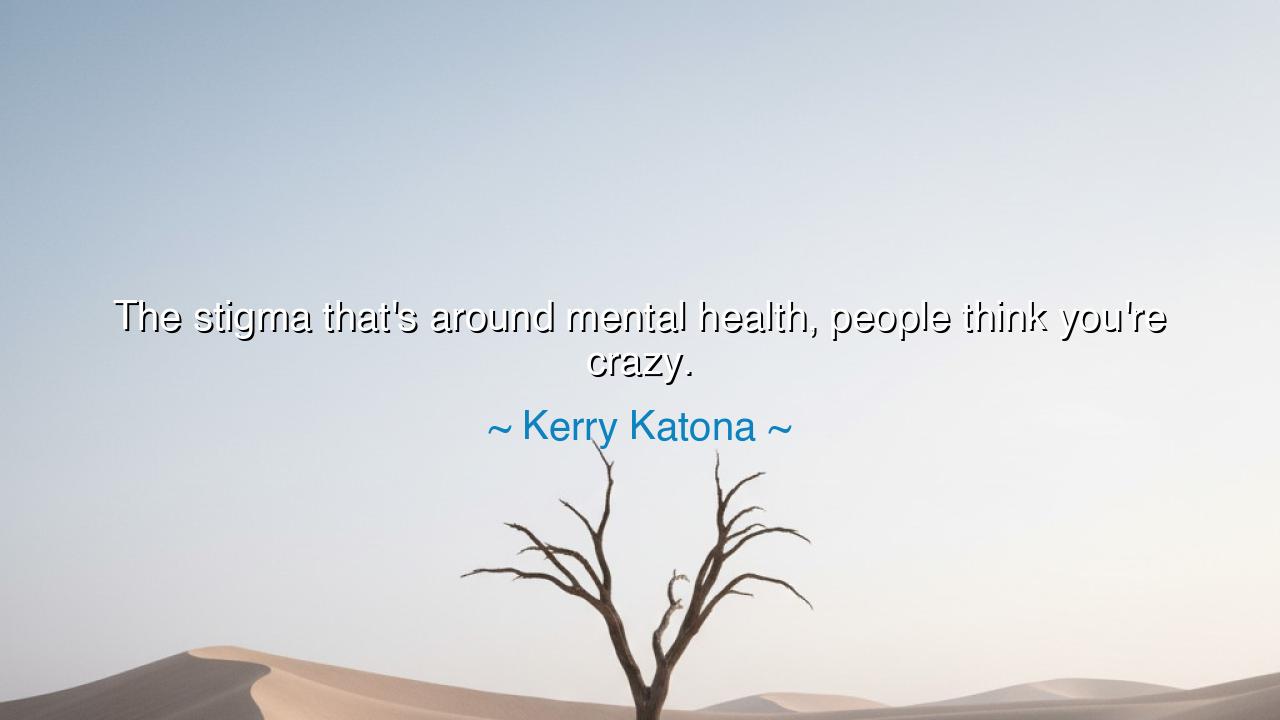
The stigma that's around mental health, people think you're






The Burden of Misunderstanding
Hear the heartfelt words of Kerry Katona, a woman who has walked through storms both seen and unseen: “The stigma that’s around mental health, people think you’re crazy.” These words, though simple, are carved from the stone of personal suffering. They speak of a wound that humanity still carries—the wound of judgment, of fearing what it does not understand. For when the mind trembles or falters, society too often turns away, branding the sufferer as weak, unstable, or strange. Yet Katona’s cry is not one of despair; it is a call for compassion, for wisdom, for the awakening of hearts that have forgotten the sanctity of the human spirit.
The Meaning of the Teaching
In this teaching lies a mirror for all who listen. Mental health, the invisible harmony of mind and soul, is as vital as breath itself. Yet those who struggle with its shadows are treated not as patients in need of care, but as outcasts to be whispered about. Katona’s words expose a truth as old as time: that mankind fears what it cannot see. We tend the wounds of the body with tenderness, but when the mind suffers, we often turn it into shame. The word “crazy,” hurled carelessly, becomes a weapon, striking the fragile heart of one already in pain. Thus, the illness deepens—not from the sickness itself, but from the loneliness imposed by misunderstanding.
The Origin of the Words
Kerry Katona, known once for her fame in music and television, became equally known for her public battles—with addiction, depression, and the heavy gaze of a judgmental world. Her struggles were not hidden; they were lived beneath the blinding light of media and mockery. But from those ashes, she emerged not silent, but honest. Her words are born from that crucible of humiliation and healing—from the countless times she was called “crazy” when she was only hurting. Through her voice, she became a messenger for countless others who have suffered in silence. What she endured, she transformed into understanding; what was once shame became wisdom.
The Story of the Madwoman in the Garden
There is an ancient tale of a woman who lived on the edge of a village, tending a small garden where wild herbs and flowers grew. The people said she was “mad,” for she often spoke to the plants and sang to the wind. Children mocked her; elders avoided her path. Yet when famine struck, it was her herbs that healed the sick and fed the hungry. Only then did the people see that her solitude had been wisdom, her strangeness grace. But by then, the years of mockery had broken her heart. She whispered before her passing, “You called me mad when I was merely listening to the earth.”
So it is with those who suffer in mind and spirit—the world too often calls them “crazy,” not realizing they are listening to storms the rest cannot hear.
The Poison of Stigma
The stigma of mental illness is more destructive than the illness itself. It silences the weak, isolates the strong, and blinds the compassionate. It convinces the sufferer that they are unworthy of love, that their pain is something to hide. Yet all who live long enough will one day know the trembling of the mind—the nights of anxiety, the depths of despair, the weight of fear. Katona’s words invite us to strip away the pretense that mental pain is shameful. For the mind is a sacred instrument, and when it falters, it deserves care, not condemnation. The ancient healers knew this truth well: that one cannot heal a people until they have healed their hearts of fear and pride.
The Path of Courage
To speak openly of mental health is to walk the path of courage. It is to defy centuries of silence and say, “I am human, and I suffer, yet I am not broken.” Katona’s strength lies not in hiding her pain, but in revealing it. Her honesty teaches that vulnerability is not weakness—it is the bridge that connects us to one another. When one person dares to speak, another finds the strength to seek help, and a cycle of healing begins. The courage to speak one’s truth transforms stigma into solidarity, and shame into understanding.
The Lesson for the Generations
Therefore, O listener, remember this enduring truth: never mock the pain you do not understand. When you meet one who struggles, offer not judgment, but gentleness; not avoidance, but presence. Speak kindly, listen deeply, and remember that every mind is a universe of storms and stars. Support those who seek healing, and speak openly of your own trials, for silence is the soil where stigma grows. Build a world where the word “crazy” loses its venom, replaced by words like “courageous,” “enduring,” and “human.”
The Eternal Counsel
So let the words of Kerry Katona echo across the ages: “The stigma that’s around mental health, people think you’re crazy.” Let us cast away that ignorance, for it is unworthy of our shared humanity. The health of the mind is the foundation of every dream, every act of love, every triumph of spirit. To mock the wounded mind is to mock life itself. But to understand, to comfort, to stand beside those who suffer—this is the work of the truly wise. And when the day comes that no one fears to speak their pain, the world will at last be whole.






AAdministratorAdministrator
Welcome, honored guests. Please leave a comment, we will respond soon